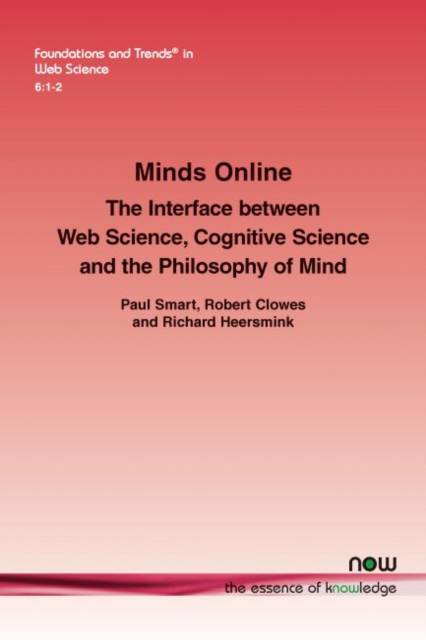
- Retrait gratuit dans votre magasin Club
- 7.000.000 titres dans notre catalogue
- Payer en toute sécurité
- Toujours un magasin près de chez vous
- Retrait gratuit dans votre magasin Club
- 7.000.0000 titres dans notre catalogue
- Payer en toute sécurité
- Toujours un magasin près de chez vous
Minds Online
The Interface Between Web Science, Cognitive Science and the Philosophy of Mind
Paul Smart, Robert Clowes, Richard Heersmink
106,45 €
+ 212 points
Description
Alongside existing research into the social, political and economic impacts of the Web, there is a need to study the Web from a cognitive and epistemic perspective. This is particularly so as new and emerging technologies alter the nature of our interactive engagements with the Web, transforming the extent to which our thoughts and actions are shaped by the online environment. Situated and ecological approaches to cognition are relevant to understanding the cognitive significance of the Web because of the emphasis they place on forces and factors that reside at the level of agent-world interactions. In particular, by adopting a situated or ecological approach to cognition, we are able to assess the significance of the Web from the perspective of research into embodied, extended, embedded, social and collective cognition. The results of this analysis help to reshape the interdisciplinary configuration of Web Science, expanding its theoretical and empirical remit to include the disciplines of both cognitive science and the philosophy of mind. Minds Online: The Interface between Web Science, Cognitive Science and the Philosophy of Mind heeds the call of the early Web Science pioneers by expanding the interdisciplinary scope of Web Science, specifically, to accommodate the disciplines of cognitive science and the philosophy of mind. There is a substantial literature to support this expansionist agenda. Given the centrality of cognition to our species-specific capabilities, as well as the level of public and scientific interest in the Web, now is arguably an appropriate time to review this literature and explicate the nature of the linkages that connect the science of the Web with the sciences of the mind.
Spécifications
Parties prenantes
- Auteur(s) :
- Editeur:
Contenu
- Nombre de pages :
- 244
- Langue:
- Anglais
- Collection :
- Tome:
- n° 13
Caractéristiques
- EAN:
- 9781680833225
- Date de parution :
- 20-09-17
- Format:
- Livre broché
- Format numérique:
- Trade paperback (VS)
- Dimensions :
- 156 mm x 234 mm
- Poids :
- 344 g

Les avis
Nous publions uniquement les avis qui respectent les conditions requises. Consultez nos conditions pour les avis.






